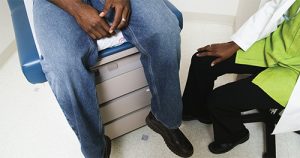
Blend Images/shutterstock.com
Be careful when prescribing allopurinol to black and Asian gout patients, a study newly advises.
Black and Asian patients who take this ubiquitous, more-than-40-year-old medication are at much higher risk of certain serious skin reactions than are Caucasians or Hispanics. Compared with Caucasians, blacks who take allopurinol to lower blood urate levels have an increased risk of the potentially deadly cutaneous disorders Stevens-Johnson syndrome (SJS) and toxic epidermal necrolysis (TEN). The risk in blacks is five times higher than in Caucasians who take the drug, according to research published in Seminars in Arthritis Rheumatology.1
SJS and TEN cause flu-like symptoms, a widespread rash and blistering and detachment of large portions of the upper layer of skin, including mucus membranes. The disorders leave the body vulnerable to severe infections and are fatal in up to 32% of cases, the study notes.
Risk of SJS and TEN in Hispanics taking allopurinol is likely equal to that of Caucasians taking the drug, the study newly reports. It also confirmed a body of research that shows certain patients of Asian descent are at increased risk, relative to Caucasians.
The current study shows that compared with Caucasians, the risk of potentially lethal adverse effects from SJS and TEN is 12 times higher for Asians.
These findings are based on an analysis of hospitalizations of patients from various racial and ethnic groups hospitalized for SJS and TEN included in a database representative of U.S. hospitalization between 2009 and 2013, as well as other population data.
Elevated risk in both Asians and blacks correlates with corresponding racial and ethnic incidence of the HLA-B*5801 carriage, a strong determinant of allopurinol hypersensitivity syndrome, the study points out. The syndrome is a collection of symptoms that includes SJS, TEN, eosinophilia, leukocytosis, fever, hepatitis and renal failure.
“[Because] allopurinol is the only ULD [urate-lowering drug] with an established association with SJS/TEN—and in light of its extreme market dominance in the U.S.—our findings support the use of extra caution among Asians and blacks when considering allopurinol,” says Hyon Choi, MD, DrPH, the paper’s senior author. He is professor of medicine in the Division of Rheumatology, Allergy and Immunology at Harvard Medical School and director of the Gout and Crystal Arthropathy Center at Massachusetts General Hospital in Boston.
The Analysis
ACR guidelines already recommend HLA-B*5801 carriage screening for certain Asian populations, including Koreans with severe chronic kidney disease and Han Chinese and Thai patients, even if their renal function is normal.2 “Those who carry the genes are associated with a very high risk of developing severe allopurinol hypersensitivity syndrome,” explains Dr. Choi. However, these guidelines don’t comment on the use of allopurinol in patients of Japanese or other Asian backgrounds, or in blacks or Hispanics.
